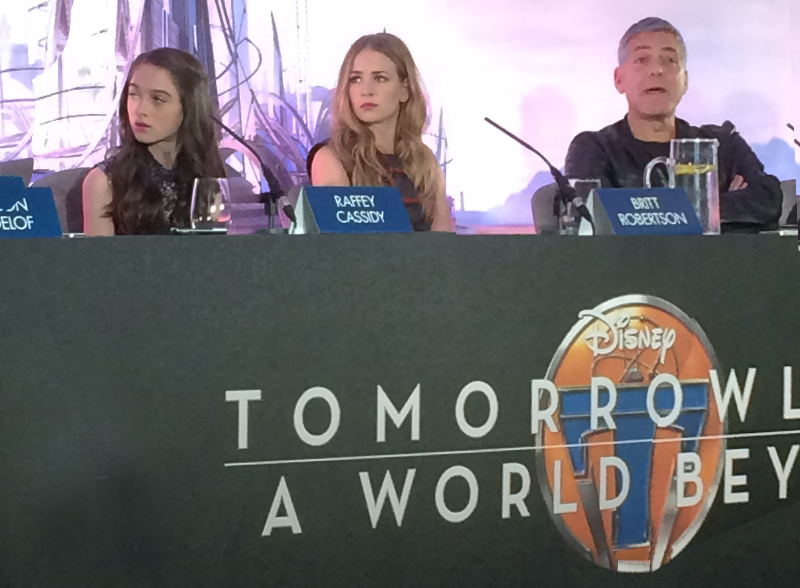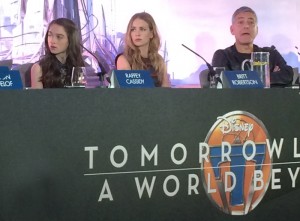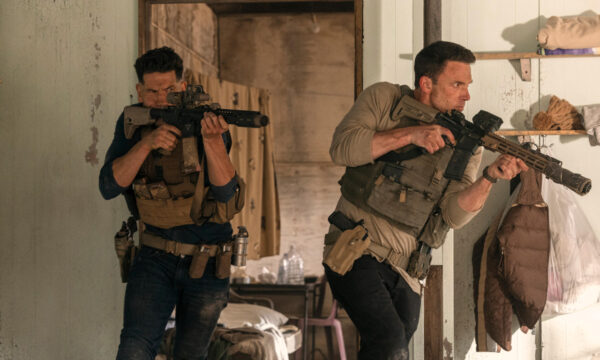Tomorrowland: A World Beyond press conference with George Clooney, Britt Robertson and Raffey Cassidy

Ahead of the release of Disney’s latest blockbuster Tomorrowland: A World Beyond, The Upcoming caught up with the stars, director Brad Bird and writers Damon Lindelof and Jeff Jenson to chat about their experiences making the film, their ideal tomorrows and wolf-jet pack hybrids.
George, how important do you think it is to make socially conscious films to influence the younger generation?
George Clooney: Well, that’s a good question. I’ve done several films that probably weren’t very inspirational for 15-year-olds, but I liked the message and the idea of this one. When I was growing up, there was the ideal that your voice – not the famous person’s voice or the politician’s voice but the individual’s voice – could change the world.
We saw it happen, we saw Rosa Parks on the bus, we saw things change and we believed that we had the ability to do that. I think over time we’ve lost sight of that a little bit; I think it’s really important to make a film like this just to say the future is not inevitable, and what seems very dark and gloomy doesn’t necessarily have to be. We created it, we can change it and it doesn’t have to just be the people with the greatest amount of power, it can be a 15-year-old reporter.
In what ways does Tomorrowland stay true to Walt Disney’s visions and his values?
Brad Bird: Walt Disney, as an individual, had a view of the future that it was undecided but exciting. It was something that could be fun, it was something where science wasn’t the enemy, it was actually just another thing to play with and be inspired by. So, I think that in the loosest sense we were trying to make a film that came from that camp. It’s a film about what tomorrow could be.
Damon Lindelof: We didn’t want to make a movie that had any magic in it, we wanted it grounded in reality. But that is very much a part of what a Disney film is. I think that we tried to take the idea that Brad was talking about and marry it to something that was a little more plausible, a little more adventurous.
Jeff Jenson: Just to add to that, researching Disney history was a huge part of our brainstorming process; finding ideas, finding inspiration in things like Walt’s original planning for Epcot as a place that would be an actual living laboratory, with scientists and industrialists and artists coming together to find ideas to make the world a better place. It had something very inspiring and idealistic about it and inspired a lot of the things that become pretty evident in this film.
What was the scale of this film, how did it compare to other films you’ve worked on?
GC: Oh, this little independent film? (laughs) It’s a big one, I mean it was big. Often when you work on a film of this scale it’s all just green screen and you don’t really get any idea of the scope, but we were in places where either we had these giant beautiful sets that we actually got to see or we were in Valencia in that insane building (The City of Arts and Sciences). I’ve never seen anything like it, it was a dreamer who built that. For all of us the fun part was that we got to see some of the scope as opposed to having it put in later with CGI.
Brad, how does your previous animation work inform your live action films?
BB: I think it helps with pre-visualising stuff. In animation you have to know what you want and it helps to be able to draw things to show people what you’re doing. So, in this film, where we were dealing with a lot of things that partially were there and partially weren’t, like the sequence where Britt touches the pin and spends several minutes with no cuts in Tomorrowland, all of that had to be planned. The camera is constantly moving from something that’s there to something that’s not and following something that’s not there and that leads you to something that is there – and animation helped with that. Definitely.
Britt, George has had massive success behind the camera, as well as in front of the camera. Are you looking to follow the same path?
BR: Yeah, it definitely interests me, I just feel like if I did it I would want to do it well. I need more experience and I need to work with more people like George and Brad and this whole group of people. Everyone’s so amazing. I just hope to do more things like this to gain some experience. And take it one step at a time at a time!
Brad, your name has become synonymous with family movies, which seem to be very rare these days. Is there a secret to that all ages appeal?
BB: If there is I wish I knew it because I have no idea. I’m just like “that seems like a good idea!” It’s not a very intellectual process. I think movies are tough because you’re trying to connect with people whose lives are very different from yours. If you thought about it logically there’s no way we’d ever try and do the job. The only thing that’s ever made any sense to me is just to make a movie that I would want to see and hope that other people connect with that.
In crafting such an upbeat adventure movie especially one the involves the pursuit of optimism, is there a greater statement embedded in that against the tent-pole dystopian blockbusters?
DL: I don’t think that any of us set out to turn up our noses at those films, we actually love those films and I’m the first in line for Hunger Games, I’m going to see Mad Max tonight when we’ve finished here. I love that stuff but I also feel like we’re not seeing the alternative. While entertaining to watch, though, I don’t want to live in those realities, I don’t want robots trying to kill me or zombies trying to eat me.
JJ: Nibble on you, maybe.
DL: Yeah, nibble. Walt lived in a time that was just as turbulent as the time that we live in now, if not more so and still he was able to imagine and believe in our capabilities as a species to transcend all that. This was more about what we could do as opposed to what everyone else was doing.
JJ: Some of my favourite films are dystopian and bleak, and I think they have a value in scaring us towards living differently. But I love the idea of making an original film. That was like a market place correction on that, offering something different.
George, what drew you to this script and what kind of tomorrow would you like to see?
GC: The minute I got the script I wanted to work with them, I loved the idea. I thought it was very brave; I loved the themes in it, I like the idea and the argument it makes.
I grew up in a time when news was as bad. Quite honestly, if you think about the sixties there were so many things going on, with the assassinations and with the civil rights movement and with the race riots and the women’s rights movements and everything. It felt like the world was going to fall apart and still there was the Apollo mission, there was us landing on the moon and we always thought that it was going to somehow work out. I’ve always believed in that. It was part of what attracted me to the film.
George, Britt and Raffey, what did each of you find most scary that you were asked to undertake?
BR: Well, Raff had all the challenging stuff, I just had to roll around and react to things being shot at me or scary people attacking me.
RC: No, but you trained for months on ab stuff!
BR: Yeah, I was working out my abs.
RC: Well, I trained for quite a while on martial arts. But I was lucky, because we had an amazing stunt team I was able to do a lot of the stunts. I never found it scary because they always made sure I was comfortable with what I was doing so I was always just up for it.
BR: She’s very brave.
GC: I trained for minutes because I had to fight an old other TV doctor. I was afraid of just getting beaten with a cane the whole time. I think that was our great stunt, wasn’t it? You know, I’ve gotten to the point in my career and it is funny, when I was in my 30s I was the guy that punched someone and walked away with explosions behind me but now I just get the hell beaten out of me. I get socked in the face and fall down and cry. So I didn’t have to do a whole lot, I mostly had to just get beaten up a lot, which was kind of fun for me. I enjoyed it.
George, how strange was it to see the younger actor playing your character?
GC: Hey, just so you know, cos probably you don’t know but I actually played that part too. That’s how good I was.
DL: He was very convincing.
GC: I was very convincing for that part. He was great, actually, wasn’t he? I was blonde when I was his age, strangely and now I’m getting blonde again! That’s good fun. But he was terrific, he was really fun. I didn’t get to work with him, obviously, because I would be working with myself somehow, which I don’t want to do. So I really didn’t get to see any of what he was doing until I saw the film, so it was fun to see what impersonations of me he was going to do.
In the film there’s three wonderous methods of transportation, the jet packs, the teleportation and the rocket. Which would you choose?
GC: I’d go with jet pack. Jet pack, don’t you think, over a rocket? Because the rocketship…? What do you think?
BR: What was the other option?
GC: Teleportation.
BB: Teleportation, that’s cool but it’s all vibratey, you feel kind of ill after. No, I’m jet pack all the way.
DL: I get chilly easily so I’d probably go with the teleportation.
BR: I love that! I get cold too, I don’t know what to choose! Probably jet pack.
GC: Somebody’s gotta take a rocket, come on!
JJ: I’ll take the rocket, why not? But also because I remember when we were writing this story I said, there has to be a rocketship in Tomorrowland. I wanna go to space, I’d love to go to the moon. Not much further though.
George, what kind of message would you like cinema-goers to take away from this movie?
GC: I think that might be a question better for Brad. As an actor, films are designed as entertainment, you’re supposed to get two hours or relief or something else other than what you’re doing in your life, so for me what you want to take away is two hours of enjoyment. If along the way, you take your kids and end up having conversations about other issues I think that’s a bonus.
BB: Yeah, it’s not supposed to be this multivitamin that fixes everything, you know? Some of my favourite movies are movies that stayed with me after I left the cinema.
GC: Reservoir Dogs.
BB: Yeah, yeah! A lot of dystopian films. That’s what I love about cinema: it almost feels like a dream you had that was particularly vivid and there’s a dream that you can revisit and find other sides to. If we made that kind of movie that would be great for me.
George, what kind of things that seem impossible today would you like to see in the future?
GC: When I was growing up the future seemed like it was going to be flying cars and all that sort of thing, which didn’t happen, but on the other hand we never would have thought of smartphones either. So what you think of the future being, it never really is. It usually surprises you in better and more interesting ways.
I would hope that as we get older and get a little more used to our technologies that we get away from them a little bit. I think we’re losing a little bit of living our lives now, as we’re recording it. I would hope that somewhere in there we get a little bit more in touch with each other. But my vision of the future is like a return to letter writing so maybe I’ve just got the wrong idea…
Natasha Furlong
Tomorrowland: A World Beyond is released nationwide on 22nd May 2015.
Watch the trailer for Tomorrowland: A World Beyond here:
https://www.youtube.com/watch?v=lNzukD8pS_s






















Facebook
Twitter
Instagram
YouTube
RSS